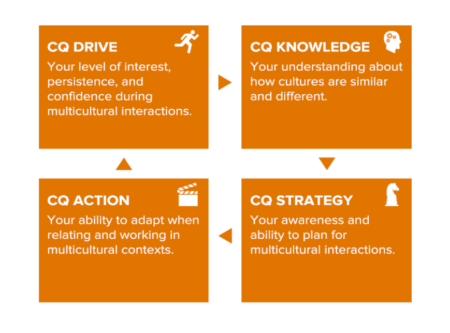Diversity… Inclusion… Equity… Equality… Justice… Underrepresentation… Racism… Homophobia… Trans rights… Neurodivergence… Pronouns… Ableism… Body shaming… Allyship… Discrimination…
It can feel like a minefield… and if you’re not sure-footed – it is.
How can you make sense of this massive body of work called, variously, Diversity, Equity and Inclusion? And how does this new concept, CQ – cultural intelligence fit in?
The way I find to best summarise it is this – If Diversity is the richness of the landscape, and Inclusion is the winding road through it, to reach our destination of Equitable outcomes, then CQ is the best, most robust, vehicle to get us there1.
Diversity is simply the mix of visible and invisible differences. The problem is, that as humans, we’re predisposed to be drawn to similarities, and difference can activate problematic bias, so how can we create a culture of inclusion, to reach equitable outcomes, if we don’t know how to navigate that road? CQ – Cultural Intelligence – is the framework of behaviours that helps us to become more inclusive.
When bias is activated as a result of being faced with difference, whether that’s a visual difference or an opposing perspective, how we slow down to respond, rather than to react, to such an interaction, is dependent on our ability to draw on our CQ, to pilot our way thoughtfully towards effective relations.
When we ask ourselves, what is stopping us from being better and more successful at DEI efforts, we might say, time, or resources, or money, or knowledge. But, when we keep peeling back the layers of those answers, what’s stopping us from making the time? What’s stopping us from reprioritising? What’s stopping us from having the difficult conversation with our boss about those decisions? Eventually, we may come to the answer, that it’s our Bias.
Bias remains our biggest enemy when it comes to sustained and sustainable change. How we move forward must always be cognisant of this, so we must have a methodology to create procedural changes to mitigate the impact of bias2.
CQ: The HOW-To DEI
CQ – Cultural Intelligence is the capability to work and relate effectively with those who are different from you, and it has been academically proven that if you are high in this skill you will think, behave and communicate inclusively3. It is the procedure we require.
Many people and organisations know why they want to do something about a lack of diversity and underrepresentation, and some know what they want the outcomes of any action to look like, but how to move, from the why to the what, has been the hurdle that many have struggled to steer. The “how”.
Understanding and adopting CQ as part of a fundamental individual, and organisational, set of behaviours is the “how”.
CQ isn’t just about nationalistic or racial differences, e.g. whether you bow or not when you see a Japanese person, or if you should look someone in the eye from a North African country, it’s far more widely applicable. CQ is the improvable skill, which, if you develop all four capabilities, will allow you to mitigate the dangers of bias, and embrace difference, allowing you to pursue effective conscious inclusion and to make progress with your DEI efforts.
The Four CQ Capabilities:
CQ Drive—the curiosity and motivation needed to work well with others.
CQ Knowledge—understanding the kinds of differences that describe one group versus the next, without resorting to stereotyping specific cultures/ backgrounds/ lived experiences.
CQ Strategy—learning how to plan effectively in light of differences.
CQ Action—being able to adapt behaviour when the situation requires it.

You can see how this framework has the capacity to from the foundations of effective DEI thinking; in order to be successful, it’s not about doing something about race over there, and sexuality over here, and disability later, and gender now… it’s about asking what is it about me, my team, my organisation that needs to change so I can be more effective at working and relating with you. How do I, my team, my organisation, develop CQ, so we can become more diverse and inclusive, resulting in equitable outcomes.
So, if CQ is the vehicle, then you are the driver. And, in order to get to your destination of a tricky and some times risky road, it’s important to plan well, but know, you have the back up of listening to the navigation system; those with expertise who can help, like the Cultural Intelligence Center.
 Marsha Ramroop
Marsha Ramroop
Founder & Director Unheard Voice Consultancy Ltd
Marsha was the inaugural Director of Inclusion at the Royal Institute of British Architects (RIBA), applying CQ across the organisation and introducing it to the architecture and built environment sector. She has her own strategic organisational inclusive culture consultancy, bringing CQ as a foundational behavioural framework in order to better embed EDI/DEI efforts. She worked in broadcasting and journalism for 30 years before moving solely into EDI work, but always with a view to give the unheard voice a place to speak – an inclusive and mindful approach to storytelling, that formed the basis of thinking and prompted the need to cultivate expertise in this area, and led to her setting up Unheard Voice Consultancy Ltd.
1 https://cqonline-1.com/products-services/dei/
2 https://twitter.com/CalvinKLai/status/1127958431225262087?s=20&t=MgamtRgeTyj3WysbGy4c1w
3 https://cqonline-1.com/about-cultural-intelligence/research/
About the Cultural Intelligence Center
The Cultural Intelligence Center is an innovative, research-based consulting and training organization that draws upon empirical findings to help executives, companies, universities, and government organizations assess and improve cultural intelligence (CQ) – the ability to work effectively with people from different nationalities, ethnicities, age groups, and more. We provide you with innovative solutions that improve multicultural performance based on rigorous academic research. More information about the Cultural Intelligence Center can be found on our website located at http://www.CulturalQ.com.
Stay Connected
Follow Us on LinkedIn | Subscribe to our Newsletter | Contact Us
Like what you’re reading? Sign-up for our monthly newsletter here.